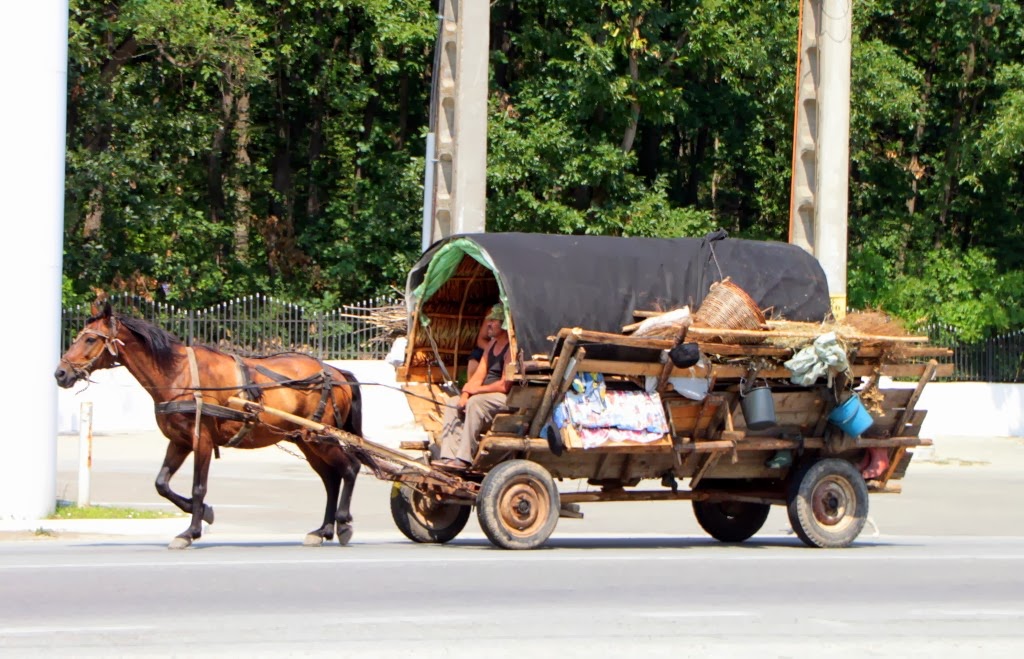8) TUESDAY, 5 JULY 1977: 320KMS. - PRILEP / (TITO) VELES.
From MOJKOVAC via IVANGRAD we continued towards the east passing KOSOVSKA MITROVICA, to PRISTINA. In SKOPJE, we stopped to change money and buy alcohol burner from a fully air-conditioned and modern shopping center (like Siam Square). It seems that SKOPJE is very modernized than any other cities in Yugoslavia that we passed.
After SKOPJE, we came across with horse or donkey-drawn wagon of Gypsy caravan, this minority frequently seen living in Rumania.
From MOJKOVAC via IVANGRAD we continued towards the east passing KOSOVSKA MITROVICA, to PRISTINA. In SKOPJE, we stopped to change money and buy alcohol burner from a fully air-conditioned and modern shopping center (like Siam Square). It seems that SKOPJE is very modernized than any other cities in Yugoslavia that we passed.
After SKOPJE, we came across with horse or donkey-drawn wagon of Gypsy caravan, this minority frequently seen living in Rumania.
 |
| Horse drawn Gypsy caravan - Photo : Robert & Mihaela Vicol @ publicphoto.org / Google images search |
We drove passing a vast field full of yellow sunflowers and also farmlands growing apples and grapes. People are the same friendly as everywhere here in this country. When driving through various villages or passing people, we had to wave our hands to people and children, staring at our campervan. It was just like we were somebody they knew !
 |
| Photo : Bing images search |
We reached TITO VELES almost at twilight. In TITO VELES, like every city in Yugoslavia, many people especially young teenagers are prominent on paths of pedestrian streets in the city. Some of them clustered into groups chatting on the streets. It looked like there was a fair or people were having some celebrations. We sat in a coffee shop looking at those teenagers walking back and forth for several different rounds. Girls huddled together and boys were walking together among them. I thought this was a sort of cultural practice, allowing opportunities for teenagers to meet as well as good chances for them to make friends or flirting in public.
 |
| (Tito) Veles - Photo : Eugene Hamil "Spirit of photography" / Bing images search |
Wherever we moved to in the area, it seemed to get attention of more people . Whichever way I looked to, my eyes met with others keeping theirs towards us. The people kept calling and provoked each other to look at us . Probably, there were not many of narrow-eyed, Asian look like me or Thai people ever came to this place. There were those brave passers-by and were not shy, came straight to us questioning us with their smily faces as from which part of the world I (we) came. Only few people know whereabout of my country, Thailand. So I had to mention that it was near Vietnam. Most people thought I was from China as they know about a Hong Kong filmstar, Bruce Lee, who is very popular in Kung-Fu movies. Otherwise, they thought I was a Japanese instead.
 |
| Bruce Lee - Photo : Bing images search |
Believe it or not, at TITO VELES this evening, I (or we) became a teen idol in no time. Those teenage boys doing sports had given special attention and came together to talk to us, starting with small groups and gradually became a larger group of about 20-30 people posing different questions and listened to what we said attentively. It was funny, we couldn’t respond to all questioins they poured to us. All of them seemed very willing to provide assistances and invited us to join them for a cup of coffee at their tables. Moreover, there were those wanting also to invite us to their homes to teach them karate as they likely misunderstood that I was karate expert. (I even didn’t know how to do Karate but only some self-defense Thai boxing ! :-D )
 |
| (Tito) Veles - Photo : wikipedia.org / Bing imagres search |
Most young people here can speak English very well as they learn English as a foreign language (I was told). Other foreign languages are French, German and Russian as a sequence. But so far we found less people speaking other foreign languages, particularly English speaking people just can be found in this city. Before that, we used sign language as a hint to communicate with people.
A walk and hanging around in the city lasted until around 11.00 pm., from where we drove out toward PRILEP and found a nice parking for camping under a tree by the roadside (away from TITO VELES about 30 km).
Until now I have learnt 2 Yugoslavian words : “qvala” : means thank you and “dobre” : means good/ well.


No comments:
Post a Comment